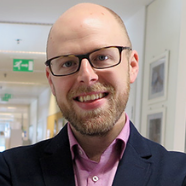
Tom has a diverse training background in biochemistry, developmental neurobiology and degeneration signalling. He obtained a BSc (Hons) in Biochemistry, graduating top of his class with 1st Class Honours from the National University of Ireland, Galway. Subsequently, he moved to the UK to undertake doctoral training on the Wellcome Trust Four-Year PhD Programme in Integrative Neuroscience at Cardiff University, UK. Here, Tom completed his PhD studies in developmental neurobiology with Professor Alun M Davies FMedSci FRS co-supervised by Professor Stephen B Dunnett, FMedSci. His work has revealed new axon growth mechanisms in developing sensory, sympathetic and dopaminergic neurons.
Tom was recruited to the MRC Protein Phosphorylation & Ubiquitylation Unit at the University of Dundee, Scotland, for his postdoctoral studies. His work with Ian Ganley, PhD (mitophagy, autophagy) and Miratul Muqit FRCP FRSE (Parkinson’s disease) demonstrated the importance of PINK1-independent basal mitophagy in a variety of organ systems in different physiological contexts and the clinical significance of PINK1-dependent Parkin activation for Parkinson’s disease. In 2018, he opened his independent laboratory at the University of Helsinki and was appointed Tenure Track Assistant Professor of Mitochondrial Medicine. He has secured competitive funding from the Academy of Finland, Novo Nordisk Foundation, Sigrid Jusélius Foundation, Finnish Cardiovascular Foundation, support from the University of Helsinki and participates in industry-academia collaborative research. Tom was recently elected a Faculty member in the Cell Signalling and Cell Biology sections of F1000 Prime (Faculty Opinions).
Autophagy is a cellular recycling process that breaks down defective intracellular components to safeguard cellular integrity and sustain metabolism. Impaired autophagy signalling is linked to neurodevelopmental and neurodegenerative disease, and the specific recycling of mitochondria is of significant interest to Parkinsonian nigrostriatal neurodegeneration. Here, damaged mitochondria are decorated with specialised ‘eat me’ signals, which enables their capture and elimination by selective autophagy. Our laboratory studies the regulation of cell and tissue-specific autophagy pathways in various contexts, with a major interest in the mammalian nervous system. We use a combination of cell-based, transgenic and pre-clinical animal models to identify and validate organelle “eat me” signals. We combine strategies in molecular and metabolic cell biology with sophisticated genetics, advanced microscopy and informatics. We benefit significantly from excellent core facilities, particularly in single-cell genomics, genome editing, organoid approaches, state-of-the-art in vivo imaging and electron microscopy. We actively collaborate with leading clinical researchers to decipher the mechanistic basis of human diseases where autophagy is implicated. Our ultimate aim is to make a meaningful impact at the mechanistic interface of discovery and translation.